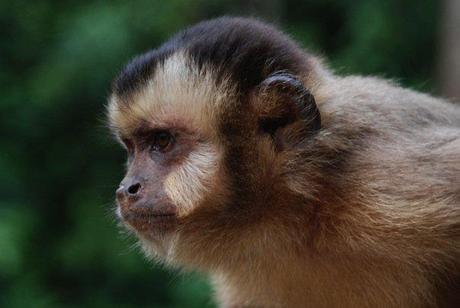
Current UK legislation permits a person to own any primate as a pet provided they have the appropriate licensing. The term ‘any’ is not an exaggeration, this license can be issued for anything from a marmoset to a chimpanzee. Ironically it is known as a Dangerous Wild Animal license (DWA) and is an open acknowledgement that the creature it allows you to keep in your home poses a significant risk to your safety. The ‘dangerous’ aspect of this license pops up in the news frequently and there are many high profile cases of the manifestation of this risk, however how often do we examine the ‘wild’ side of things and explore how such an alternative lifestyle in captivity affects the welfare of these exceptionally intelligent animals. With a growing number of unwanted pet primates ending up in rescue and rehabilitation centres it seems like the time to delve deeper into these issues.
In 2006 a law known as the Animal Welfare Act (AWA) came into action. In its simplest terms it is an outline of the duty of care all people have to animals in their possession, anyone found to be violating this duty can be prosecuted under this law in court. It lists 5 rights that any animal should have covering both physical and psychological wellbeing- appropriate food and water; appropriate shelter; protection from pain, injury and disease; protection from fear and stress; and freedom to express normal behavior.
Looking at our most common pets, a dog for example. We can go through that list in its skeleton form and confidently say “yes, I can provide that” our dogs have their food and water dishes, live safely in our homes, have wonderful veterinary plans and get treats and cuddles should they be nervous at the sound of a firework or a thunderstorm. This is because dogs and cats alike are domestic animals well suited to the captive environment. However wild animals such as primates have an exceptionally complex range of needs that simply cannot be catered for in our homes.
This seems like a very bold statement however it is not without evidence. With some ambiguity there are thought to be around 250 different species of primate alive today and many of these contain further sub-species. Each occupies their own highly specific niche thus having highly specific requirements for life. Some are meat eaters, fruit eaters, eat only leaves or eat a bit of everything. Some are arboreal living only in treetops, some live up mountains or in desserts. Some are solitary whilst others live in troops hundreds strong. Some are male dominated, some female. Some are nocturnal… and the list goes on. How we could begin to assess the ‘appropriate’ conditions for each individual species in accordance with the AWA is a grand enough task on its own, yet it is still more complicated than that.
One thing all primates have in common is their intelligence. This brings about some incredible social complexity and it is here that welfare in the pet trade is truly compromised. Sanctuaries across the UK report a trend of very common abnormalities, both physical and behavioural in almost all rescued primates. From obesity and diabetes to repetitive ritualised movement, and even self-harm. Us Brits have a pretty solid reputation as being a nation of animal lovers and many of the families that have had to give up their primates have indeed been kind and caring owners according to sanctuary staff. So what is it that is causing the development of such terrible characteristics? Primatologists collectively believe that the complete lack of social normality inhibits normal brain development much in the same way that an isolated human would suffer.
The brain is capable of so many complex processes. It is constantly releasing hormones and causing instinctual behaviours, however as pets primates have not had the opportunity to learn the correct way to manage them and they often become overwhelmed. Even when kept in pairs the same problems are reported, and surprisingly zoological collections (which usually contain larger groups) also suffer similar fates.
Again primatologists attribute this to the need for more complex interaction, for example if you were to spend your life with only a select few people you would have no appreciation of variation in any way, would bore of that person and would probably have an overwhelming desire to get away from them- sometimes we feel that after a few hours with an un-stimulating person, let alone a lifetime. However in that situation we have the freedom to move on and spend time with another person, in another location. We have the total freedom to explore our environment. We are unrestricted.
The excitement for the ownership of primates is often explained by the identification that ‘they are so much like us’. We interpret their expressions and it is not sympathy we feel when we see them suffering, it is empathy as we see their intelligence and therefore their capability to feel as we feel. With that in mind, should we really be permitted to obtain a license at all?
Man On Wire director James Marsh’s new film Project Nim explores the nature verses nurture argument further providing compelling evidence for the fact that primates do not belong in a human society. Viewing highly reccommended!
